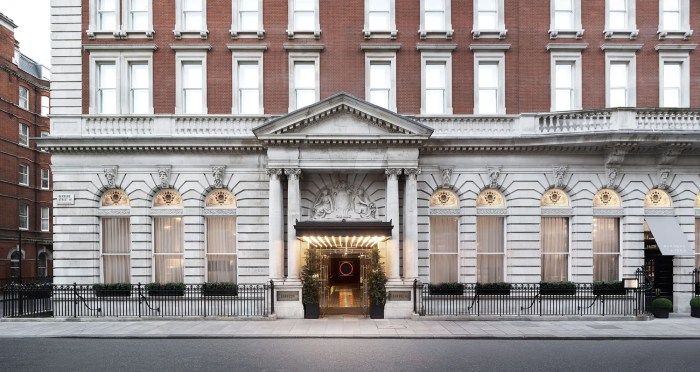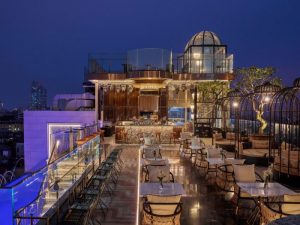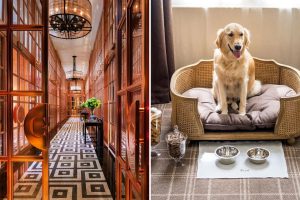
Boutique hotels in historic buildings sets the stage for this enthralling narrative, offering readers a glimpse into a story that is rich in detail with casual formal language style and brimming with originality from the outset.
Explore the elegance of staying in a historic building while enjoying the luxury and personalized service of a boutique hotel. Dive into the unique blend of modern amenities and architectural charm that these establishments offer.
Boutique Hotels

Boutique hotels are small, stylish hotels that typically have a unique design, intimate atmosphere, and personalized service. These hotels are often found in historic buildings and cater to guests seeking a more personalized and distinctive experience.
Characteristics of Boutique Hotels
- Unique Design: Boutique hotels are known for their individuality and design flair, often reflecting the local culture or history.
- Intimate Atmosphere: With fewer rooms than traditional hotels, boutique hotels offer a more intimate and cozy setting.
- Personalized Service: Guests can expect tailored services and attention to detail, creating a more personalized experience.
- Attention to Detail: Boutique hotels focus on the finer details, from decor to amenities, to ensure a memorable stay for guests.
- Local Influence: Many boutique hotels incorporate elements of the local culture, cuisine, and traditions to provide a unique and authentic experience.
Historic Buildings

Historic buildings hold a unique charm and appeal for boutique hotels, offering a sense of character, heritage, and a story to tell. The rich history and architectural details of these buildings create a special ambiance that guests often find captivating.
Examples of Historic Buildings Turned into Boutique Hotels
- The Plaza Hotel in New York City, originally opened in 1907, is a prime example of a historic building transformed into a luxurious boutique hotel.
- The Ritz Paris, a legendary hotel in Paris established in 1898, showcases a blend of historic charm and modern elegance.
- The Brown Palace Hotel & Spa in Denver, Colorado, dating back to 1892, offers a glimpse into the past while providing top-notch hospitality.
Preserving Historical Elements in Modern Hotel Experiences
One of the challenges of converting historic buildings into boutique hotels is striking a balance between preserving the architectural integrity and incorporating modern amenities for guest comfort. However, successful preservation efforts can result in a unique and memorable stay for guests, offering a blend of the old and the new.
Design and Architecture
Boutique hotels in historic buildings often strike a delicate balance between preserving the architectural heritage of the past and incorporating modern design elements to cater to contemporary travelers. These unique establishments offer guests a chance to immerse themselves in history while enjoying the comfort and luxury of modern amenities.
Blend of Modern Amenities and Historic Architecture
- Boutique hotels in historic buildings seamlessly integrate modern amenities such as high-speed Wi-Fi, state-of-the-art entertainment systems, and luxurious bathrooms into the historic structures.
- Architects and designers carefully consider the historical significance of the building when renovating or designing boutique hotels, ensuring that the original charm and character are preserved.
- The juxtaposition of old and new elements creates a captivating atmosphere that appeals to travelers seeking a unique and memorable experience.
Common Design Elements
- Exposed brick walls, original hardwood floors, and ornate moldings are common design elements found in boutique hotels located in historic buildings.
- Vintage furniture, bespoke artwork, and antique fixtures are often used to enhance the historic ambiance and add a touch of luxury to the guest rooms and common areas.
- Architectural details such as arched doorways, grand staircases, and stained glass windows are carefully preserved and highlighted to showcase the building’s unique heritage.
Importance of Architectural Preservation
- Architectural preservation is crucial in maintaining the authenticity of historic structures and ensuring that future generations can continue to appreciate and enjoy these architectural gems.
- By preserving historic buildings and incorporating them into boutique hotels, developers can contribute to the revitalization of urban areas and promote cultural heritage tourism.
- Respecting the architectural integrity of historic buildings not only honors the past but also provides a sense of place and identity for guests who stay in these unique accommodations.
Guest Experience
Staying at a boutique hotel in a historic building offers a truly unique guest experience that blends luxury with a sense of history and charm.
Exclusivity and Intimacy
Boutique hotels excel at creating a sense of exclusivity and intimacy for guests by offering personalized services, unique room designs, and attention to detail that larger chain hotels may lack. The limited number of rooms in boutique hotels ensures that each guest receives individualized attention and feels like a valued visitor rather than just a room number.
Role of Storytelling
Storytelling plays a crucial role in enhancing the guest experience within a historic setting. Boutique hotels often weave the history of the building into the overall design and decor, allowing guests to immerse themselves in the past while enjoying modern comforts. By sharing the unique stories and heritage of the building, guests can develop a deeper connection to the place they are staying in, making their experience more memorable and meaningful.
In conclusion, boutique hotels in historic buildings offer a unique combination of luxury, history, and personalized service. Whether it’s the exclusive guest experience or the preservation of architectural authenticity, these hotels provide a memorable stay for travelers seeking something beyond the ordinary.
Popular Questions
Are boutique hotels in historic buildings more expensive than regular hotels?
Boutique hotels in historic buildings can vary in price depending on the location, amenities, and level of luxury offered. While they may be pricier than standard hotels, the unique experience and historical charm often justify the cost.
How do boutique hotels maintain the historical elements while providing modern amenities?
Boutique hotels achieve this balance by carefully preserving the architectural features of the historic building while integrating modern conveniences seamlessly. This blend of old and new creates a unique atmosphere for guests.
What sets the guest experience in boutique hotels in historic buildings apart from regular hotels?
The guest experience in boutique hotels is characterized by personalized service, attention to detail, and a sense of exclusivity and intimacy. Guests often feel like they are part of a story when staying in these historical establishments.





